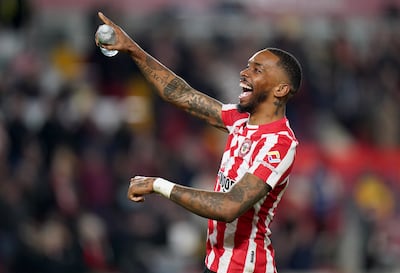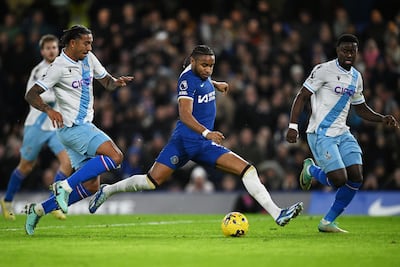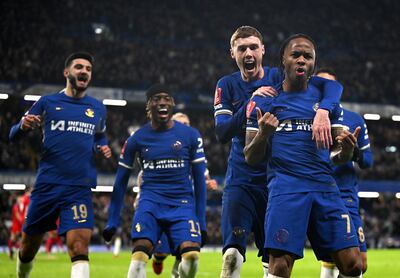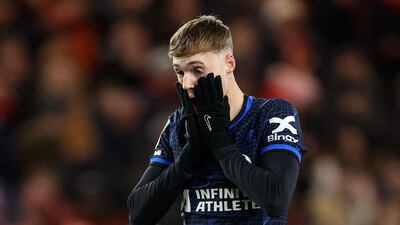Tuesday night's shock defeat to second-tier Middlesbrough in the League Cup semi-finals first leg encapsulated everything about Chelsea since the start of last season, both the good and the bad – mainly the bad.
Let's start with the good (it won't take long): Chelsea once again dominated possession, controlling 72 per cent of the ball, and created a fair few chances, taking 18 shots with five on target.
Now for the bad: Chelsea couldn't score, nor avoid defeat.
The 1-0 loss at Riverside Stadium, courtesy of Hayden Hackney's 37th-minute goal, was Chelsea's 31st defeat dating back to the beginning of the 2022/23 campaign. Of clubs currently in the Premier League, only Bournemouth and Nottingham Forest (32) have lost more matches in that time.
Yet, no top-flight club can match Chelsea's abysmal record of 21 away defeats in that same time period.
Questionable game management and defensive issues have played their part in the Blues' ongoing misery, but the biggest contributing factor continues to be their struggles in front of goal.
A recent overall upturn in league form means Chelsea now have the seventh-best scoring record in the division – a significant improvement on last season, when only four clubs scored fewer goals – but of their eight defeats in the Premier League this campaign, seven could arguably have had different outcomes were the Blues more clinical.
As a consequence, Chelsea languish 10th in the table, and unless Mauricio Pochettino finds a way to solve his team's profligacy then another year without European football surely beckons.
So, how does the Blues manager go about fixing this particular, and glaring, problem? These are the options available to the Argentine.
Time and patience
The very virtues Pochettino has been preaching ever since he was appointed manager last summer.
Chelsea have experienced an unprecedented overhaul in the past 18 months, with 23 senior squad players arriving and 19 leaving on permanent deals in just three transfer windows. Such extreme turnover was only ever going to result in disjointed and inconsistent performances and time is needed for it to all come together as a cohesive unit.
Pochettino's task of gelling the squad has been further complicated by the absence of so many players through injury during his first half-season in charge. At present, eight first-team players are sidelined, led by captain and star player Reece James, while at one stage that number was as high as 14.
Patience is also required when taking a longer-term view of the Chelsea squad. Owners Todd Boehly and Clearlake Capital have focused their transfer strategy on signing some of the most exciting young talents in world football, but that has come at the expense of experience.
Only James, Thiago Silva, Raheem Sterling, the perennially injured Ben Chilwell, Robert Sanchez and arguably Conor Gallagher could be classed as experienced Premier League players, and that has cost Chelsea dearly this season.
While time and patience are needed at Stamford Bridge, in a cut-throat results business like elite football, they are not usually afforded.
Sign a striker
It's symbolic of Chelsea's muddled approach to transfers that despite almost £1 billion spent on players in the past 18 months, the team is still in desperate need of a goalscorer, a focal point of their attack.
Wouldn't some of the £280 million invested in four central midfielders – Moises Caicedo, Enzo Fernandez, Romeo Lavia, and Lesley Ugochukwu – have been better spent on a striker?
The Blues did spend £30 million to sign Nicolas Jackson from Villarreal last summer, but the 22-year-old Senegalese is young and raw and needs much more time to adapt. He is also absent for the next few weeks on Africa Cup of Nations duty. His rival for the No 9 role, Armando Broja, has impressed Pochettino since his return from long-term injury but at the same age also lacks experience.
Should Chelsea turn to the transfer market this month, what are their options? Given the club's recent outlay, Financial Fair Play will have to be a consideration, so big-money arrivals will likely depend on outgoings.
Even if Chelsea were given carte blanche, options to solve their striker problem this month look limited. England international Ivan Toney, valued at more than £100m, has pledged to repay Brentford's support during his ban; Girona have insisted Artem Dovbyk, the Ukrainian who has fired their surprise La Liga title bid, is going nowhere this month; and Nigerian superstar Victor Osimhen recently signed a new contract with Napoli.
Pochettino has revealed Chelsea "are looking for opportunities" in the transfer market and that talks with the owners about new signings have been "really good". But is there a reliable goalscorer available now that can help solve their problems?

Bank on Nkunku
When Christopher Nkunku joined Chelsea last summer, it was hoped the France international would be the solution to their goalscoring woes. While still not a thoroughbred striker, Nkunku has thrived when deployed in the role and his record for RB Leipzig – 58 goals over two seasons – suggests he has no problem finding the net.
He impressed during pre-season when he assumed a key role in Chelsea's new-look attack alongside Sterling and Jackson, but a serious knee injury kept him out for six months. Since making his debut last month, Nkunku has shown promise, scoring off the bench against Wolves in his first league appearance and providing an extra cutting edge in the final third, even while clearly lacking match fitness.
However, the 26-year-old is injured again, this time a hip injury keeping him out of the FA Cup victory against Preston and the League Cup defeat to Middlesbrough. Pochettino is hopeful it's not serious, but it continues a concerning trend for Nkunku, who missed the 2022 World Cup with a knee injury.
When fit and firing, Nkunku has the ability as a scorer and creator to make a huge impact on this Chelsea team. Getting and keeping him fit, however, has proved the biggest challenge so far.

Trust the current squad
In addition to Nkunku, there is no shortage of attacking talent in the Chelsea squad.
Cole Palmer has been a revelation since joining from Manchester City with 15 goal involvements (eight scored, seven assisted). Sterling is, with the exception of last season, a proven reliable Premier League goalscorer. Mykhailo Mudryk may have his detractors but the Ukrainian has the skills, pace and potential to be a terrifying winger. Jackson has shown plenty of promise, even if he's been guilty of missing more than a few chances.
Noni Madueke, meanwhile, has shown his desire to take responsibility in big pressure moments, Broja has the ability to make a difference in the box, and even midfielders like Gallagher and Fernandez are more than capable of contributing goals.
Chelsea have not had any problems creating chances; they have created the fifth-most big chances in the Premier League this season (44). However, they are second in most big chances missed (40).
If options in the January transfer market are not forthcoming, then Pochettino will have no choice but to trust his current players. There is enough attacking quality in the squad to find greater consistency in front of goal, even if it requires time and patience.





























